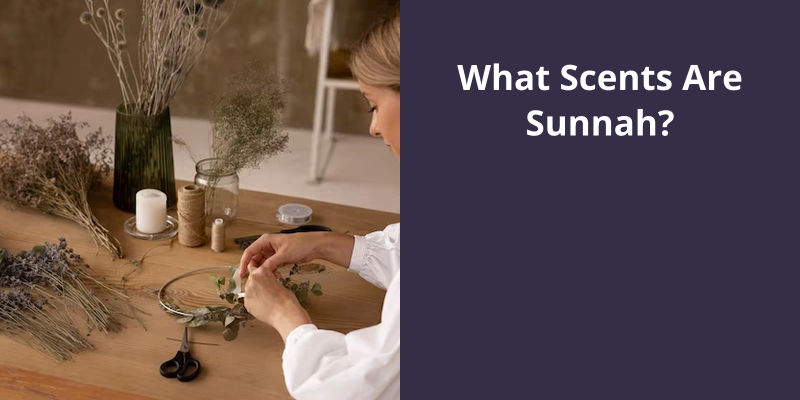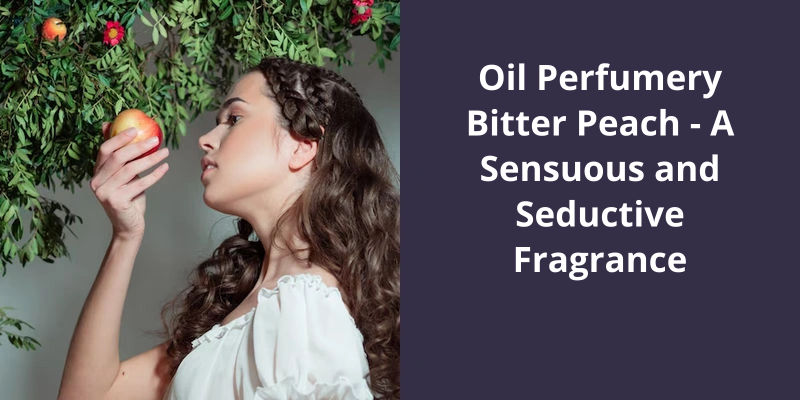What Scents Are Sunnah? In the world we live in today, with it’s fast-paced lifestyle and constant distractions, it’s easy to overlook the simple pleasures of life. One of these often forgotten delights is the power of good smells. The Prophet Muhammad, peace be upon him, was not one to underestimate the significance of scent. He believed that a pleasant fragrance has the ability to uplift the soul and bring joy to the heart. It’s said that the Prophet had a deep appreciation for scents like oudh, musk, and ambergris. In fact, he once stated that his favorite scent was that of musk. His beloved wife Aisha also attested to his fondness for oudh, considering it the best type of perfume in his eyes. This emphasis on good smells serves as a reminder of the importance of paying attention to the small details in life, and the profound impact they can have on our overall well-being. So, let’s take a moment to appreciate the wisdom of the Prophet Muhammad and explore the scents that are considered sunnah, and perhaps, incorporate them into our lives to experience the beauty and serenity they bring.

What Is the Best Halal Perfume?
When it comes to selecting the best halal perfume, there are a few brands that stand out for offering quality products made with natural and organic ingredients. One of these brands is Christy Organics, a Melbourne-based perfumery that’s known for it’s vegan and organic roll-on perfumes. Their scents are crafted with care, ensuring that they aren’t only luxurious but also in line with halal standards.
This brand offers a wide range of perfumes that are free from alcohol, making them suitable for Muslims who want to adhere to halal principles. Their fragrances are carefully crafted using natural ingredients and are long-lasting.
Wardah Cosmetics is another brand that stands out for it’s halal perfumes. This Indonesian brand is known for it’s high-quality cosmetic and skincare products, and their perfumes are no exception. Their scents are created using natural ingredients and are specially formulated to be halal-certified.
Ridha Naturals is a brand that focuses on creating halal perfumes using natural and organic ingredients. Their scents aren’t only free from alcohol but also free from any animal-derived ingredients, making them suitable for vegans as well.
Ink & Ocean is another brand that offers halal perfumes made with natural ingredients. Their scents are inspired by the ocean, giving off a fresh and invigorating feel.
Sunnamusk is a well-known brand for it’s halal perfumes that are created using natural ingredients. They’re known for their unique and long-lasting scents that are free from alcohol and other harmful chemicals.
Maison Sybarite is a brand that specializes in creating halal perfumes using organic and vegan ingredients.
Brûmée Fragrances is another brand that offers halal perfumes made with natural ingredients.
By doing so, you can ensure that you’re choosing a fragrance that isn’t only in line with halal standards but also good for your skin and overall well-being.
The rich and captivating scents that Muslims use have a deep-rooted significance within Islamic culture. Oud, musk, rose, and sandalwood are among the popular fragrances that hold a long-standing tradition in perfumes, incense, and various aromatic substances. These cherished scents not only exude beauty but also have a profound connection to spirituality and personal well-being.
What Scent Do Muslims Use?
What scent do Muslims use? Some popular Islamic fragrances include oud, musk, rose, and sandalwood. These scents have a long history in Islamic culture and are commonly used in perfumes, incense, and other aromatic substances. Oud, also known as agarwood, is derived from the resinous heartwood of certain trees and is highly valued for it’s unique fragrance. It’s often referred to as the “wood of the gods” and has a long association with spirituality and meditation.
Musk, on the other hand, is a natural substance obtained from the musk deer and is known for it’s strong and captivating aroma. It’s been used in Islamic culture for centuries for it’s sensual and uplifting qualities. Rose, a symbol of beauty and love, is another commonly used scent in Islamic fragrances. It’s delicate and sweet fragrance is often associated with the divine and is believed to have a calming and soothing effect on the senses.
Sandalwood, with it’s woody and earthy scent, is also highly regarded in Islamic culture. It’s been used in religious ceremonies and rituals for it’s grounding and purifying properties. These scents aren’t only used individually but are often blended together to create unique and captivating fragrances that are loved by many Muslims around the world.
In addition to these specific scents, Muslims also value cleanliness and personal hygiene. The Prophet Muhammad (peace be upon him) emphasized the importance of cleanliness and having a pleasant fragrance. It’s recommended for Muslims to bathe regularly, wear clean clothes, and use perfumes or fragrances that are pleasant and not overpowering. This emphasis on cleanliness and pleasant scents is a reflection of the Islamic teachings on maintaining physical and spiritual purity.
These fragrances not only provide a pleasant sensory experience but also hold cultural and spiritual importance, adding depth and meaning to the Islamic traditions and rituals.
The Role of Fragrances in Islamic Rituals and Practices
- The role of fragrances in Islamic rituals and practices
- The use of attar (perfumed oils) in Islamic traditions
- The significance of incense in Islamic worship
- Fragrances and their association with purification in Islamic rituals
- The use of perfumed oils during special occasions and celebrations
- The symbolic meaning of certain fragrances in Islamic culture
- The use of fragrances in personal hygiene practices in Islam
- The cultural and historical relevance of perfumes in Islamic societies
- Fragrance rituals in Islamic weddings and ceremonies
- The spiritual and emotional impact of fragrances in Islamic rituals
Prophet Muhammad (peace be upon him) cherished cleanliness and the allure of pleasant scents, as attested in numerous hadiths. He consistently displayed a fondness for fragrances such as musk, ‘ud, and ambergris, recognizing their appeal and appreciating their aromatic qualities.
What Scents Did the Prophet Like?
Prophet Muhammad (peace be upon him) had a deep appreciation for cleanliness and pleasant fragrances. Numerous hadiths emphasize his fondness for scents such as musk, ud, and ambergris. These scents held a special place in his heart, reflecting his desire for cleanliness and purity in all aspects of life.
A strong aroma of musk resonated with the Prophet, and he often wore it or used it as a fragrance in his surroundings. The captivating scent of musk is known to uplift ones mood and create a pleasant atmosphere. It’s use aligns with the Prophets commitment to maintaining a serene and delightful environment.
Similarly, ud, also known as agarwood, had a special significance for the Prophet. This wood emits a unique and distinctive fragrance that’s highly valued. The Prophet appreciated the calming and soothing effects of ud and recognized it’s ability to enhance spirituality and devotion.
Ambergris, a substance derived from the digestive system of sperm whales, was also among the scents beloved by the Prophet. It’s earthy and warm fragrance captivated his senses, symbolizing his inclination towards the beautiful and natural elements of creation.
In addition to these specific scents, the Prophet encouraged the use of any pleasant fragrance that brings joy and delight to oneself and others. He viewed cleanliness and pleasant fragrances as integral aspects of a Muslims appearance and character.
It serves as a reminder for Muslims today to embrace cleanliness, good hygiene, and the use of pleasant scents as a means of embodying the teachings and spirit of the Prophet Muhammad (peace be upon him).
The Use of Scents in Religious Rituals and Ceremonies
In religious rituals and ceremonies, the use of scents holds significance in various traditions. Islamic traditions, Sunnah, encourage the use of pleasant scents as a way to enhance spiritual experiences and attract blessings. The Prophet Muhammad (peace be upon him) emphasized the importance of pleasant fragrances and recommended their use in daily life and special occasions.
Aside from personal hygiene, using scents, such as musk, oud, rose, and sandalwood, can be part of the Islamic etiquette. Applying fragrance before attending congregational prayers, gatherings, or important events is a way to honor the occasion and display reverence. The subtle scent serves as a reminder of the presence of God and enhances the overall spiritual atmosphere.
However, it’s important to note that the use of scents should be moderate and not overpowering to others. Balancing personal preference with consideration for others is a part of adhering to the Islamic teachings regarding scents. Ultimately, the use of pleasant fragrances in religious rituals serves as a way to increase spirituality and create a serene ambiance.
Halal fragrance aims to cater to the needs of Muslim consumers who adhere to the guidelines of their faith when it comes to personal care products. By ensuring that these fragrances are free from any forbidden elements, they provide an alternative option for Muslims who wish to maintain their religious integrity while still enjoying scented products.
What Is Halal Fragrance?
Halal fragrances are typically made using natural ingredients and essential oils that are extracted from plants, fruits, and flowers. These ingredients are carefully selected to ensure that they don’t violate any of the Islamic principles. For example, alcohol-free perfumes are preferred since consuming alcohol is strictly prohibited in Islam.
This includes ensuring that the production facilities are clean and free from any impurities. Additionally, there may be specific rules concerning the sourcing of ingredients, such as avoiding exploitative practices and ensuring fair trade.
Muslims who adhere to Islamic principles might choose to use these halal alternatives in their homes and personal spaces, creating an environment that’s in harmony with their beliefs.
Overall, the concept of halal fragrance stems from the idea of living a pious and ethical life in accordance with Islamic teachings.
Conclusion
In conclusion, the scents that are considered Sunnah, or recommended in Islamic tradition, are perfumes like oudh, musk, and ambergris. These scents hold a special significance in Islamic culture and serve as a reminder of the Prophet's love for pleasing fragrances. Therefore, incorporating these scents into our lives not only fulfills a Sunnah practice but also adds beauty and positivity to our surroundings.





